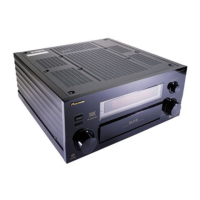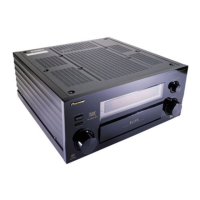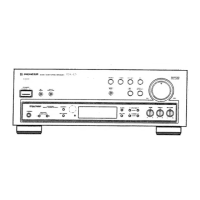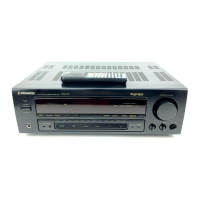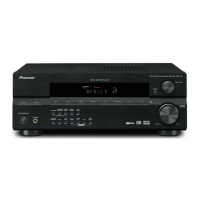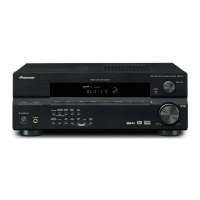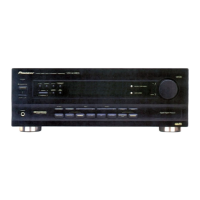Do you have a question about the Pioneer Elite VSX-49TXi and is the answer not in the manual?
General advice on reading all safety and operating instructions before use.
Emphasizes paying attention to all warnings and precautions on the unit and in the manual.
Advises to follow all operating and usage instructions for the product.
Warning against exposing the unit to water or moisture.
Precautions related to lightning and electrical storms.
Guidance on proper handling and care of the power cord.
Warning against overloading circuits and outlets.
Advice on when and how to seek service for the unit.
Details the receiver's advanced multichannel audio concept for realistic sound reproduction.
Explains the i.LINK interface for connecting components and enjoying multichannel digital audio.
Describes the MCACC system for easy setup and optimal surround sound effects.
Highlights compatibility with DVD Audio and other formats for high-quality processing.
Discusses THX Ultra2 certification and support for new digital audio and video formats.
Explains the video converter feature for flexible video component connections.
Notes the receiver's low energy consumption in standby mode.
Verify all included accessories are present before proceeding with setup.
Instructions for inserting batteries and understanding the remote control's features.
Explains the battery level warning system and replacement procedure.
Describes the location and function of the touch pen and lock switch.
Instructions for applying cushions to the remote control's feet.
Details the effective range and potential interference for remote control operation.
Provides important safety precautions and guidelines for installing the receiver unit.
Instructions on how to open the front panel of the receiver.
Guides users through the process of setting up the remote control's touch panel and basic adjustments.
Explains how to turn the remote control's backlight on or off.
Explains fundamental concepts of home theater audio setup and components.
Guides on connecting a DVD player and TV, including digital audio connections.
Details how to connect speakers to the receiver, including terminal identification and wiring.
Instructions for connecting the power cord and turning on the receiver.
Guides on assigning digital input jacks to specific components like DVD players.
Step-by-step guide to automatically configure surround sound settings using the microphone.
Instructions on how to play a DVD and achieve surround sound playback.
Advice on adjusting sound settings and using expert setup for refined audio.
Illustrates how to connect a TV using various video cable types like S-Video, component, and composite.
Guides on connecting various video components, including DVD/LD players, detailing video and audio hookups.
Instructions for connecting VCRs or DVRs using S-video or composite video and analog audio.
Details how to connect portable video devices to the receiver's front panel inputs.
Guides on connecting satellite TV tuners, covering video and audio signal hookups.
Explains how to connect analog audio sources like CD players and turntables using RCA cables.
Details connecting multichannel analog audio sources like DVD-A or SACD players for surround sound.
Guides on connecting digital audio sources using coaxial, optical, or RF cables for Dolby Digital/DTS.
Lists the default assignments for digital input jacks to various components.
Instructions for connecting FM and AM antennas for optimal radio reception.
Comprehensive guide on connecting speakers, including placement and terminal identification.
Provides guidelines and diagrams for optimal speaker placement for surround sound effects.
Instructions on how to connect and use the receiver's AC power cord.
Details the function and limitations of the receiver's switched AC outlet.
Explains the i.LINK interface, its capabilities for digital audio, and compatibility.
Guides on physically connecting i.LINK devices to the receiver using appropriate cables.
Instructions on setting up an i.LINK network by chaining components and managing connection speeds.
Identifies and explains the functions of all buttons and indicators on the receiver's front panel.
Details all the terminals and connectors located on the rear of the receiver and their functions.
Describes the buttons and functions of the remote control unit.
Explains the different display screens on the remote control's LCD for receiver operation.
Details the secondary display screens on the remote control for accessing additional receiver functions.
Explains the various indicators and information displayed on the receiver's front panel display.
Guides on selecting speaker types, sizes, and configurations for optimal surround sound.
Instructions for balancing the sound output levels of individual speakers for optimal audio.
Details how to set speaker distances for accurate surround sound delay and positioning.
Explains how to use the room equalizer feature to adjust speaker frequency response.
Instructions for copying acoustic calibration settings to customize sound profiles.
Guides on verifying the automatically configured surround sound settings after setup.
Instructions on how to play back audio sources in stereo or multichannel modes.
Explains how to select the number of playback channels (5.1, 7.1, AUTO) for optimal audio output.
Guides on selecting the appropriate input signal type for various audio sources.
Details support for high-resolution audio formats and playback requirements.
Explains the different listening modes available for various audio sources and setups.
Describes modes like Pro Logic II, Neo:6 for enhancing 2-channel sources.
Explains modes like SX and EX for expanding 5.1 sources to 7.1 playback.
Details THX modes for achieving cinema-like sound quality from any source.
Introduces advanced modes for movie soundtracks that optimize sound effects based on source and configuration.
Explains concert hall simulation modes for music playback, enhancing acoustics and ambiance.
Guides on how to adjust the intensity of sound effects in advanced listening modes.
Instructions on how to listen using the calibrated EQ settings for optimal sound.
Explains how to use the Digital Noise Reduction feature to minimize extraneous noise.
Describes the Midnight Mode for improving surround sound clarity at low listening volumes.
Explains the Loudness Mode for boosting bass and treble, useful for music at low volumes.
Guides on adjusting bass and treble frequencies and bypassing tone circuitry.
Explains how to adjust sound delay to synchronize audio with video playback.
Details playback options for DVD Audio and multichannel inputs, including DIRECT and ADJUST modes.
Explains the dual mono setting for discs with dual mono soundtracks.
Describes how to use the input attenuator to lower analog signal levels.
Guides on using the Tape 2 Monitor function to listen to analog recordings.
Instructions on connecting and using headphones with the receiver.
Explains how to switch between different video inputs for viewing on the TV.
Guides on adjusting the brightness level of the receiver's fluorescent display.
Shows how to view the current status of various receiver settings.
Explains how to adjust COLOR BURST settings for optimal setup screen display on certain TVs.
Guides on tuning FM and AM radio stations using automatic search or manual step tuning.
Explains how to use MPX mode for improved reception of weak FM broadcasts.
Instructions on directly tuning to specific radio station frequencies using the remote control.
Guides on storing up to 30 radio stations in memory across three classes for quick access.
Explains how to assign custom names (up to 10 characters) to memorized radio stations.
Guides on how to recall memorized radio stations using class and channel numbers.
Guides on programming the remote to operate other A/V components like DVD players and TVs.
Steps to recall previously stored settings for controlling external components.
Instructions for teaching the remote control new commands from original component remotes.
Explains how to lock remote setup settings to prevent accidental changes.
Details how to use the remote control's programmed functions for DVD and TV operations.
Guides on setting the DIRECT FUNCTION to OFF for external video sources not passing through the receiver.
Explains how to make recordings from one component to another, noting digital and analog limitations.
Guides on setting up speaker system B for stereo playback in another room or for bi-amping front speakers.
Explains how to select between speaker systems A, B, or A&B for different listening configurations.
Details how to connect external amplifiers to power speakers for enhanced audio output.
Guides on using separate pre-amplifiers or power amplifiers for advanced audio setups.
Explains how to set up and use the multi-room feature for independent audio/video playback in different rooms.
Step-by-step guide for configuring the multi-room system, including IR receiver settings and volume levels.
Instructions on how to control the sub-room system from the main room using the receiver's controls.
Guides on operating the receiver and selecting sources in the sub room using its remote control.
Explains how to control other PIONEER components using the receiver's remote control via a control cord.
Guides on programming and executing multi-operation sequences to control multiple components with one button press.
Details the steps to use pre-programmed multi-operation sequences for simplified component control.
Explains how to program and use the SYSTEM OFF feature to turn off multiple components simultaneously.
Provides instructions on how to activate and use the SYSTEM OFF function for powering down components.
Guides on customizing screen names on the remote control for better component identification.
Explains how to rename buttons on the remote control's screens for custom operations or graphics.
Guides on assigning specific digital input jacks to components when not using default settings.
Instructions on assigning component video input terminals to specific video sources.
Guides on assigning i.LINK-equipped components to functions for selecting audio and video signals.
Accesses advanced settings for sound customization, convenience, and system configuration.
Allows adjustment of the on-screen display positioning to better match your TV screen.
Guides on setting the peak level for ultra-low bass tones to prevent distortion from speakers.
Explains how to compress dynamic range for clearer surround sound at low volumes.
Allows adjustment of audio signal output for surround and surround back speakers from multichannel inputs.
Guides on renaming functions on the receiver's display and OSD for personalized system configuration.
Explains how to use HI-BIT/HI-SAMPLING for wider dynamic range and finer audio reproduction.
Guides on setting up the THX Ultra2 subwoofer for optimal bass response and to prevent boominess.
Explains how to set the distance between surround back speakers for optimum THX ASA sound experience.
Explains Dolby Digital surround sound, its features, and Dialog Normalization.
Details Dolby Pro Logic II technology for enhancing surround sound from two-channel sources.
Explains Dolby Digital Surround EX for 6.1 channel sound and surround back channels.
Overview of DTS audio formats, known for high quality sound and dynamic surround effects.
Details DTS Extended Surround formats for discrete 6.1 channel content and enhanced realism.
Describes DTS Neo:6 technology for transforming two-channel sources into 6.0 channel surround sound.
Explains the DTS 96/24 high-quality format for enhanced sound detail.
Overview of THX standards and technologies for achieving cinema-quality sound in home theater environments.
Restores correct tonal balance to movie soundtracks for home theater playback.
Filters surround speaker information to match front speaker tonality for seamless panning.
Expands listening position and creates spacious surround sound with two speakers.
Explains THX Ultra certification requirements and guarantees for high performance.
Details THX Surround EX technology for reproducing extra surround back channels for enhanced audio imaging.
Explains ASA technology for optimizing surround sound using multiple speaker configurations.
Describes THX Ultra2 Cinema mode for playback of multichannel digital signals using all speakers.
Details THX MusicMode for optimizing multichannel digital music sources with surround back speakers.
Compensates for excessive bass due to room boundaries, especially with THX Ultra2 subwoofers.
Crucial advice on speaker placement for accurate and realistic surround sound, including angles and distances.
Diagrams and guidance for placing speakers in a complete THX certified system.
Specific speaker placement recommendations for DVD-A and multichannel music sources.
Explains common messages displayed during i.LINK interface operation and their solutions.
Provides solutions for common problems related to i.LINK, power, unit response, and overheating.
| Channels | 7.1 |
|---|---|
| HDMI Outputs | 1 |
| Component Video Inputs | 3 |
| Component Video Outputs | 1 |
| Multi-Channel Input | Yes |
| Dolby Digital | Yes |
| DTS | Yes |
| i.LINK (IEEE 1394) | Yes |
| MCACC | Yes |
| Input Sensitivity | 200 mV |
| Audio Formats Supported | Dolby Digital, DTS, Dolby Pro Logic II, DTS-ES, DTS Neo:6 |
| Video Formats Supported | Composite, S-Video, Component |
| Digital Audio Inputs | 4 (optical), 2 (coaxial) |
| Digital Audio Outputs | 1 (optical) |
| Frequency Response | 5 Hz - 100 kHz |
| Video Inputs | 5 Composite, 5 S-Video, 3 Component |
| Video Outputs | 2 Composite, 2 S-Video, 1 Component |
| Surround Sound Modes | Dolby Digital, DTS, Dolby Pro Logic II, Neo:6 |
